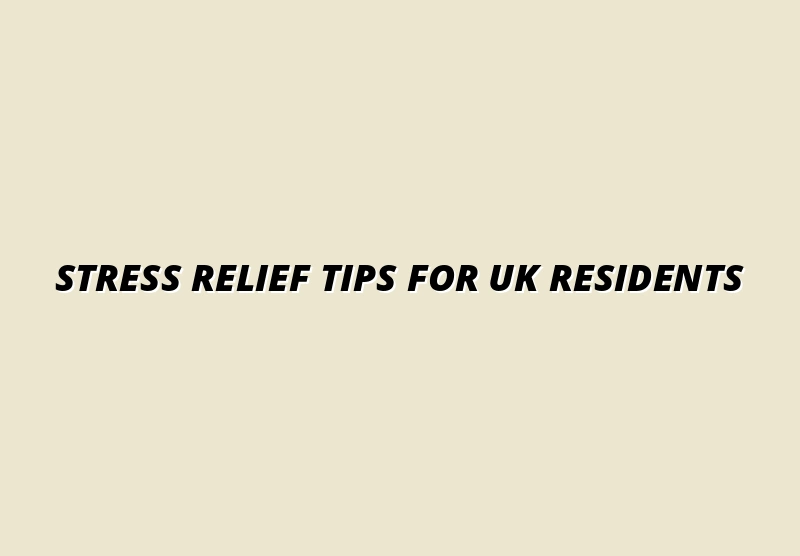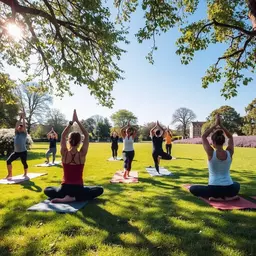Stress Relief Tips for UK Residents

In a world where stress has become the norm, understanding its effects is more crucial than ever. Imagine navigating daily life with a clearer mind and a healthier body—this is possible through effective stress management. By recognizing the impact of stress and implementing proven techniques, you can reclaim your well-being.
What You Will Learn
- Stress significantly impacts both mental and physical health, leading to issues like anxiety, fatigue, and chronic conditions.
- Effective stress relief is essential for emotional well-being, resulting in better mood, improved relationships, and enhanced focus.
- Consistency in practicing stress relief techniques, such as meditation and physical activity, fosters resilience and long-term benefits.
- Regular reflection on your stress levels can help identify triggers and effective coping strategies tailored to your needs.
- Community engagement and support can enhance stress management, providing a sense of belonging and opportunities for shared experiences.
- Natural remedies like herbal supplements and aromatherapy can complement stress relief efforts, promoting relaxation and well-being.
The Essential Benefits of Effective Stress Relief
Understanding the key advantages of managing stress can lead to improved well-being and a better quality of life. For more insights into holistic approaches to health, explore wellness tips for busy professionals. Below are the essential benefits depicted visually.
Improved Mood
Reducing stress can lead to greater happiness and satisfaction in daily life.
Better Relationships
Managing stress enhances communication and presence, improving connections with others.
Enhanced Focus
Less stress leads to improved concentration and productivity.
Physical Health Benefits
Stress relief reduces the risk of chronic health issues, supporting a long and healthy life.
Understanding Stress and Its Impact on UK Residents
In today’s fast-paced world, stress has become an all-too-familiar companion for many of us living in the UK. Whether it’s the pressures of work, family responsibilities, or the daily grind of life, stress can creep in and take a toll on our well-being. It's essential to understand that stress affects not just our mental health but also our physical health. By recognizing these impacts, we can take steps toward finding relief and promoting overall wellness.
Stress can trigger a variety of psychological and physical effects, such as anxiety, fatigue, and even chronic conditions like heart disease. For instance, when faced with stress, our body releases hormones that prepare us for 'fight or flight', leading to increased heart rate and heightened alertness. However, when stress is constant, it can lead to health issues like high blood pressure, sleep disturbances, and a weakened immune response. Understanding these effects is crucial as we look for effective ways to manage stress.
The Psychological and Physical Effects of Stress
Stress manifests in different ways. On a psychological level, it can lead to feelings of overwhelm and sadness. You might find it hard to concentrate or lose interest in things you once enjoyed. Physically, it can show up as headaches, digestive problems, and muscle tension. These symptoms can create a cycle, making it even harder to manage daily responsibilities. To learn more about how physical and mental health are interconnected, explore holistic ways to boost mental health.
By acknowledging these effects, we empower ourselves to seek effective stress relief. It's also essential to note that stress is not a personal failure; it’s a common experience, especially in our busy lives. Recognizing that we’re not alone in this struggle can be a comforting first step.
Why Stress Relief is Essential for Emotional Well-Being
Finding effective stress relief is vital for our emotional well-being. When we manage our stress, we can improve our mood and increase our overall quality of life. It can also enhance our ability to respond to challenges with a clear mind rather than feeling overwhelmed. Stress relief acts as a buffer, helping to protect our mental health from the adverse effects of prolonged stress.
Consider these critical reasons why stress relief is essential:
- Improved Mood: Reducing stress can lead to greater happiness and satisfaction in daily life.
- Better Relationships: When we manage our stress, we tend to communicate better and be more present, enhancing our connections with others.
- Enhanced Focus: Less stress means better concentration and productivity, allowing us to tackle tasks efficiently.
- Physical Health Benefits: Stress relief can reduce the risk of chronic health issues, supporting a long and healthy life.
At Renewed Vitality UK, I believe that embracing natural wellness practices can significantly aid in managing stress. By exploring the rich array of resources available in our communities, we can find tailored methods to help us cope with the unique stressors we face as UK residents. So, let's dive into practical techniques for effective stress relief that can make a real difference in our lives!
Quick Summary
Here's a brief recap of the key points discussed so far:
- Stress significantly impacts both mental and physical health, leading to issues like anxiety and chronic conditions.
- Effective stress relief is crucial for emotional well-being, improving mood, relationships, focus, and overall health.
- Integrating stress relief techniques into daily routines fosters resilience and long-term benefits.
- Regular reflection on stress levels can help identify triggers and effective coping mechanisms.
Frequently Asked Questions About Stress Management
What are the main impacts of stress on health?
Stress significantly impacts both mental and physical health, leading to issues such as anxiety, fatigue, headaches, digestive problems, muscle tension, and increasing the risk of chronic conditions like heart disease and high blood pressure.
Why is effective stress relief crucial for emotional well-being?
Effective stress relief is vital for emotional well-being because it improves mood, enhances communication and relationships, boosts focus and productivity, and reduces the risk of chronic health issues, ultimately leading to greater happiness and satisfaction in daily life.
How can consistency in stress relief practices help?
Consistent practice of stress relief techniques, such as daily meditation, regular physical activity, and engaging in social activities, fosters resilience and provides long-term benefits, helping individuals manage stress more effectively over time and enhance overall well-being.
What is the role of reflection in managing stress?
Regular reflection on stress levels is important as it helps individuals identify personal stress triggers, understand their typical responses to stress, recognize patterns, and determine which coping mechanisms are most effective for them. This self-awareness allows for more tailored and successful stress management strategies.
What natural remedies are suggested for stress relief?
Natural remedies like Chamomile tea (for calming effects), Lavender essential oil (to reduce anxiety and improve sleep), and Valerian Root (to promote relaxation and sleep) can complement stress relief efforts and promote a calm mindset.
Encouraging Consistent Practice for Long-Term Stress Management
As we delve deeper into stress management, one key takeaway is the power of consistency. Integrating stress relief techniques into our daily routines can create lasting benefits. By incorporating these practices, we can cultivate a sense of calm and resilience in the face of daily challenges. Think of it as nurturing a garden; the more we tend to it, the more it flourishes! For those looking to explore a range of complementary approaches, consider natural therapies for UK wellness.
Here are some practical steps you can take to weave stress relief into your everyday life:
- Set aside time each morning for a brief meditation or deep breathing session.
- Establish a regular physical activity schedule, such as walking in your local park or joining a yoga class in your community.
- Engage in social activities, whether it’s a chat with a friend or participating in a local wellness group.
- Create a bedtime routine that promotes relaxation, like reading or enjoying a cup of herbal tea before sleep.
At Renewed Vitality UK, we emphasize that consistent practice is more than a suggestion; it's a lifestyle change. By making these adjustments part of your routine, you can better manage stress over time and enhance your overall well-being!
The Importance of Regular Reflection on Stress Levels
Taking a moment to reflect on our stress levels can be incredibly illuminating. This simple act allows us to recognize how we handle stress and identify areas for improvement. By checking in with ourselves regularly, we can celebrate progress and acknowledge what still needs attention.
Here are some reflective questions you might consider:
- What situations tend to trigger my stress?
- How do I typically respond to stress? Is it healthy or unhealthy?
- Have I noticed any patterns in my stress levels over time?
- What coping mechanisms have been effective for me, and which haven't?
Taking the time to answer these questions can pave the way for greater self-awareness, leading to more tailored stress management strategies. Remember, it's all about finding what works best for you!
Final Thoughts and Resources for Ongoing Stress Relief
As we wrap up this exploration of stress management, I want to stress (pun intended!) the importance of seeking support when needed. Whether it's through local resources or national health services, there are numerous avenues available for assistance. Connecting with others who understand your journey can provide incredible relief and insight. For those interested in specific therapeutic options, consider exploring acupuncture in Frome and Bristol.
Linking to NHS and Local Mental Health Services for Support
The NHS offers a wealth of resources for anyone dealing with stress. Their support services are designed to help you navigate through tough times, offering guidance and professional help. Here are some valuable links you can explore:
- NHS Stress and Anxiety Resources
- NHS Mental Health Resources
- Your local mental health services, which may include counselling and support groups. Check your local council’s website for more details!
Encouraging Community Engagement in Stress Reduction Activities
Community engagement can be an incredibly enriching way to manage stress. Participating in local events, workshops, or support groups can foster connections and provide a sense of belonging. Plus, it’s a fantastic opportunity to discover new wellness practices and share experiences with others!
Consider exploring community events in your area such as:
- Wellness fairs featuring local practitioners and workshops.
- Support groups focused on specific stressors, like parenting or student life.
- Nature walks or group exercise classes hosted in local parks.
Exploring Herbal Supplements and Aromatherapy for Stress Relief
Incorporating herbal supplements and aromatherapy into your wellness routine can provide additional support for stress relief. Natural remedies can enhance relaxation and promote a calm mindset. Here are a few options to consider:
- Chamomile Tea: Known for its calming effects, it's perfect for unwinding before bed.
- Lavender Essential Oil: This lovely scent can help reduce anxiety and improve sleep quality.
- Valerian Root: Often used to promote relaxation and enhance sleep.
At Renewed Vitality UK, we’re passionate about connecting you with local resources, and these natural solutions can be found in many wellness shops across the UK. Explore your options and see what resonates with you! For similar insights on local wellness resources, you might find our article on wellness therapies for holistic health helpful.
Recap of Key Points
Here is a quick recap of the important points discussed in the article:
- Understanding Stress: Stress impacts both mental and physical health, leading to issues like anxiety, fatigue, and chronic conditions.
- Psychological and Physical Effects: Stress can manifest as overwhelm, headaches, and muscle tension, underscoring the need for effective management.
- Importance of Stress Relief: Managing stress improves mood, enhances relationships, boosts focus, and reduces health risks.
- Consistent Practice: Incorporating stress relief techniques, such as meditation and physical activity, into daily routines can foster resilience.
- Reflect on Stress Levels: Regular self-reflection helps identify stress triggers and improve coping strategies.
- Seek Support: Utilize resources like the NHS and local mental health services for guidance and community support.
- Engage with Community: Participate in local events and activities to foster connections and discover new wellness practices.
- Explore Natural Remedies: Herbal supplements and aromatherapy can enhance relaxation and support stress management.
Popular Posts
 Considering a transformative journey through yoga? Many individuals in Midsomer Norton are discoveri
Considering a transformative journey through yoga? Many individuals in Midsomer Norton are discoveri
 As the winter chill sets in, many individuals find themselves grappling with various health challeng
As the winter chill sets in, many individuals find themselves grappling with various health challeng
 As we navigate the challenges posed by climate change, the commitment to sustainable living is not j
As we navigate the challenges posed by climate change, the commitment to sustainable living is not j
 What if a simple shift in your awareness could transform your entire well-being? Mindfulness practic
What if a simple shift in your awareness could transform your entire well-being? Mindfulness practic
